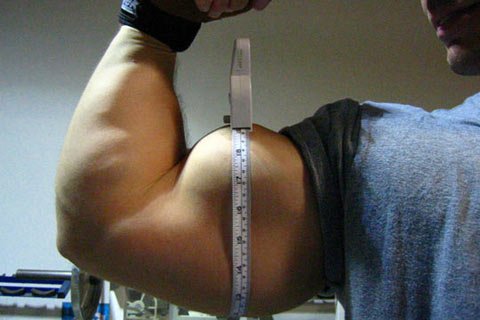Many teens ask themselves the question of whether or not their body is good enough or muscular enough or thin enough. This is a common question among many teens that have the desire to become more muscular or thinner or whatever their goal may be.
I feel that it is a good thing that many teens would like to be healthier and better looking, however, this can become a bad thing if teens become too obsessed with their body image and may turn to using unethical measures such as steroids and other illegal supplements in their desire to become more muscular or any other unsafe supplements that could potentially hurt their bodies.
The media also affects the way many teens feel about their bodies and what measures they take in order to improve their bodies. For example, in some magazines and in commercials writers may say, "Want to be huge, with python arms, huge legs, and a strong thickly muscled chest?" Magazines like these lead young adults into thinking that bigger is better when in actuality just being healthy is better.
Many teens also may be affected by pictures of muscular men on magazine covers and want to be like them and so they develop unrealistic goals. Teens may also begin to suffer from a disorder of the mind known as bigorexia or muscular dysmorphia. In this article I will discuss all of these things and more.

You May be Feeling That Bigger Is Better, But
In Truth Being Healthy Is Most Important.
Desire For Big Muscles
There are several reasons why teens may feel the need in order to gain muscle or to become thinner. Of these reasons, one may be because they want to look good for the opposite sex. This is especially common in teen boys who feel that big muscles translate into getting more girls or becoming more popular.
They may emulate male celebrities on magazines and commerials that the girls around them seem to enjoy looking at and tell themselves that someday they will look like that, when in actuality, they may never achieve the same kind of results as the magazine cover models.
These men on the magazines probably are on very restricted diets that allow them to appear very ripped and defined. Their diets could be specialized so they can keep their body fat percentage as low as possible. Diets such as these are not good for teens because they may be denied certain important nutrients needed in order to grow.
Also, most people are not as genetically gifted as the men on magazines. These models that they see on magazines are genetically superior to most of us and are able to obtain that kind of muscularity while maintaining an extremely low body fat percentage.

It Is Common For Young Men To Associate Muscles
With Getting The Girls Or Being Popular.
Desire To Be Skinnier
Teen girls may also want to be thinner and look like the supermodels that they see in magazines. They may want to look like these women that they see in magazines and in commercials and will turn to drastic measures in order to look like them. They may start to diet and restrict themselves to only certain foods.
They will lower their calories to almost nothing and try to lose as much weight as possible and will start to think that the thinner that they become the more attractive that they are. This could lead to many eating disorders such as anorexia nervosa or bulimia.
"Anorexia nervosa is a psychiatric diagnosis that describes an eating disorder characterized by low body weight and body image distortion with an obsessive fear of gaining weight. Individuals with anorexia often control body weight by voluntary starvation, purging, vomiting, excessive exercise, or other weight control measures, such as diet pills or diuretic drugs. It primarily affects adolescent females, however approximately 10% of people with the diagnosis are male. Anorexia nervosa is a complex condition, involving psychological, neurobiological, and sociological components." ( wikipedia.org)
Anorexia is a very serious disease that, if it goes untreated, could lead to very serious health problems, such as kidney and other organ problems and even death.
Bulimia is very similar to anorexia. People who are bulimic are afraid of weight gain and may feel powerless when eating and will eat uncontrollable amounts of food in one sitting. They may eat a lot of food and then purge, vomit, everything that they have just eaten. They may use laxatives to help them with getting rid of the food. This is harmful to their growing bodies and may need to seek help.
Bigorexia
Teens may also suffer from a mental disorder called bigorexia or muscle dsymorphia. This mental disorder is mainly common in teen males. They may be obsessed with gaining muscle and never feel that they are big enough. They may feel that they are very small when in they are, in fact, pretty muscular compared to most.
They will be obsessed with going to the gym and will sometimes workout several times a day and when they are not working out they may become uncomfortable and feel an urge to get back inside the gym and keep working out. They cross the fine line between being extremely motivated and being obsessed. Muscle dysmorphia is fairly common and is treatable in many teens.

Individuals With Bigorexia Feel They Are Small When
In Fact They Are Larger And More Muscular Than Most.
Conclusion
It is common and normal for teens to ask questions regarding their body and want to improve their physical appearance but they must not turn to extreme measures such as, bulimia, anorexia, and steroids because it is not worth the damage to their bodies.
Teen boys and girls can make significant changes in their physical appearance without turning to unethical measure so long as they exercise within their pace and keep to a healthy diet.
